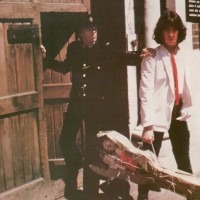These aren’t exactly the lines one expects to hear upon listening to Gary Numan’s Telekon for the first time: “And what if God’s dead? / We must have done something wrong.” This odd opening in “This Wreckage” stands in sharp contrast to the energetic and eccentric sound of his previous album, The Pleasure Principle (known for its popular hit “Cars”), and highlights perfectly the sense of paranoia that echoes throughout the 10 songs of the original track listing.
While The Pleasure Principle featured mechanical, yet upbeat, futuristic tunes, Telekon’s haunting synthetic melodies swell with a sense of hopelessness. After this album, it seems for Numan God really was dead: While Telekon marked his third consecutive No. 1 hit album in the U.K., it also signaled a commercial highpoint that his career would never reach again.
Following “This Wreckage,” “The Aircrash Bureau” continues Telekon’s disturbing-yet-whimsical tone with polymoog strings that carry the character of a song far cheerier than its dreary lyrics about a dead pilot would initially suggest. The title track then begins with heavy bass and features a beautifully chilling piano which almost sounds like it’s trying to be in a horror movie.
In the years leading up to this project, Gary Numan had quickly found himself an unexpected success — from repeatedly hitting charts with singles, to performing in sold-out tours. Songs like “Remind Me to Smile” illustrate how Numan might have been handling this success, with lines like, “Reconsider: ‘fame’ / I need new reasons / This is detention, it’s not fun at all.” This feeling of panic and desperation also comes out in the following track, “Sleep by Windows.”
“I’m an Agent” almost seems like it was intended to be a single, with a punk sound that features a quicker pace than the rest of the album. The polymoog strings that occasionally interrupt the song give it a nice pace; they also make Numan’s lyrics all the more striking, with lines like “You can be replaced, you know.”
“I Dream of Wires” and “Remember I Was Vapour” feature heavily futuristic lyrics, but are executed very differently. While “I Dream of Wires” opens with slow polymoog strings and some of the most chilling lyrics on Telekon, it satisfyingly transforms into an up-tempo mood piece. It is definitely a high point of the album, and demonstrates well Gary Numan’s talent for layering instruments to move a song along. The latter, however, falls short in many ways, lacking pizzazz when it comes to lyrics, and not offering anything new to Telekon’s now prominently established basslines and synths. It is reminiscent of the beginning of the album, but never really goes anywhere.
“Please Push No More” signifies Telekon’s return to the paranoia of fame in “Remind Me to Smile.” While the lyrics, and especially the repeated line “please push no more” are powerful in their own right, the background synths really carry a sense of melancholy.
“The Joy Circuit” finishes the original record, and continues the paranoia, but with an upbeat (and arguably rather spunky) melody. Paul Gardiner’s bass is hard not to tap along to, and that’s all the more unsettling when paired with lyrics like “Send in the guards / We are all new faces / I’m so sorry / But my reasons are wrong.” Like many of the songs on Numan’s first three albums, it’s very hard to tell exactly what the song is about, other than something horrific is conspiring. Nevertheless, the ending lines, “But all I find is a reason to die / A reason to die,” followed immediately by a frantic instrumental riff, end Telekon on much the same note as it began: troubling, yet strangely inviting.
Saying Gary Numan is a singer maybe a bit of a lie; there isn’t much to his voice at all, and that’s something he’s often discussed in interviews. It’s much more accurate to describe Numan as an artist – one who had unfortunately reaching the pinnacle of his career during the time of Telekon. While the album went on to inspire many new wave synth-pop artists during the 80s, Gary Numan’s time in the spotlight wouldn’t last long.
Despite this, there’s still something lovely offered by Telekon: Its dystopian imagery and somehow alluring unease come together to create a fascinating examination on fame and the future that any ’80s music lover should take time to appreciate.
- Gary Numan – Telekon (1980): On Second Thought - January 9, 2018




Thoughtful review. For me, it reflected a final blaze of honesty. What came after never seemed particularly heartfelt. Up to and including Telekon, Numan’s lyrics and delivery felt like a disclosure of private feelings, including alienation, anomie, and insecurity. That this very personal exposure was coupled with idiosyncratic music — electronic, but also with traditional instruments like violins — couldn’t help but draw in this listener. Thanks.
Nice review, and thanks for doing this – it’s nice to hear this perspective from someone of a generation younger than myself. I was 13 when this album came out (about the average age of his fans back then, lol), so us old-timers see this album sometimes with rose-coloured glasses. You came into listening to this album WITHOUT the fandamonium that most of us did back then, and it’s nice to know that….. well, we were right. 🙂
Those top-three albums that you mentioned are often discussed amongst Numanoid fans as his best three, although if you polled them you’d find Telekon to come in #3 on that list (my vote is #1).
The good news is that he kept the career going, and a small minority of his fans consider his 2013 album “Splinter (Songs From A Broken Mind)” to even exceed Telekon (and yes, I’m one of them).
One last point: I hated “Remember I Was Vapour” back then, but it’s a “grower”. It’s now one of my favourite tracks from that album, just behind “The Joy Circuit”. 🙂 So, give this one a chance 🙂
Again, thank you for this thoughtful post from a new perspective – it was very enlightening and entertaining.
The irony is that despite no longer being in the absolute blaze of his pop career, Gary Numan has had a serious second Renaissance over the past few years. A lot of the reviews felt that 2013’s Splinter was his best work in 35 years (and it was his first top 20 UK album in just about that long) but last Septembers Savage, which hit #2 on the UK Charts, was, in my opinion, far superior He’s been doing a lot of denser, soundtrack work, and taking the growing flirtation he’s had with middle eastern rhythms more into the fold. Savage is very much a concept album (post apocalyptic climate change Earth) without feeling strangely pigeon-holed.
So everyone who got disappointed and dispirited after the pop-funk fusion Numan of 82-92, I would say definitely give his last three albums a try; once he got tired of chasing the dragon of fame and public adoration and just started making music HE enjoyed, he improved tremendously. You can hear much more of Trent Reznors influence as well these days, which isn’t a surprise considering their friendship.